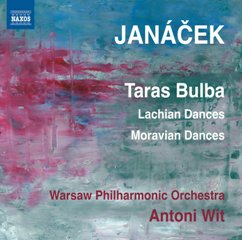Janacek – Taras Bulba • Lachian Dances • Moravian Dances (2012)
Janacek – Taras Bulba • Lachian Dances • Moravian Dances (2012)

Taras Bulba, JW VI/15 1 I. Smrt Andrijova (Death of Andrij) 9:17 2 II. Smrt Ostapova (The Death of Ostap) 5:22 3 III. Proroctvi a smrt Tarase Bulby (The Prophecy and Death of Taras Bulba) 10:15 Lasske tance (Lachian Dances), JW VI/17 4 No. 1. Starodavny (Old-Time Dance) 6:02 5 No. 2. Pozehnany (Blessed) 2:16 6 No. 3. Dymak (A Blacksmith's Dance) 2:19 7 No. 4. Starodavny (Old-Time Dance) 4:37 8 No. 5. Celadensky (From Celadra) 1:50 9 No. 6. Pilky (Saw Dance) 3:13 Moravian dances, JW VI/7 10 No. 1. Kozich (Fur Coat) 3:04 11 No. 2. Kalamajka 0:52 12 No. 3. Trojky (Threes) 1:22 13 No. 4. Silnice (Road) 2:07 14 No. 5. Rozek (Little Corner) 1:33 Warsaw Philharmonic Orchestra Antoni Wit – conductor
The coupling of Janáček’s two late orchestral masterpieces Taras Bulba and the Sinfonietta has long been a favourite programme on disc; Naxos themselves issued a CD of this pairing conducted by old Naxos stalwart Ondrej Lenard with the Slovak Philharmonic (which also included the Lachian Dances). Here Antoni Wit discards the Sinfonietta and instead gives us two much earlier Janáček scores in the shape of the Lachian Dances (again) and the Moravian Dances, of which the latter is a real rarity.
The performance here of Taras Bulba comes into competition not only with Naxos’s old Lenard performance but many others, some of which are among the jewels of the CD catalogue. Among those are an early recording by Simon Rattle with the Philharmonia Orchestra. Currently and disgracefully this is only available as a fill-up for his Covent Garden recording in English of The cunning little vixen; surely a prime candidate for re-release. A comparison with that reading makes it all too apparent what is missing here. The story behind Taras Bulba is a thoroughly unpleasant one of heroic resistance by the Cossacks to the Poles. It centres around three scenes of unnatural death – one in battle, one by torture and one by immolation. Wit and his Polish orchestra sound positively apologetic about this, choosing instead to emphasise the lyric and contemplative episodes in the score. Without the violence being graphically portrayed a whole dimension is missing, and the organ in the last movement sounds positively churchy. The string playing sounds somewhat recessed and lacking in definition in the admittedly fiendishly difficult virtuoso writing. This imbalance is a serious defect in the recording. Although the violins are precise, they do not dominate as they should in the final pages and their trills - which depict the fire in which the hero is burning - sound rather anaemic.
Even better than the Rattle performance is that by Mackerras with the Vienna Philharmonic. This is something else again. Not only do you hear the full viciousness of the orchestral writing given its due by a world-class orchestra but also there’s superlatively great recording quality which comprehensively outclasses Rattle. This recording is variously available at mid-price either coupled with a white-hot reading of the Sinfonietta or as part of a Double Decca release which also includes not only the Sinfonietta but also Huybrecht’s reading of the Lachian Dances and a number of other smaller works. Listen to the stinging violin tone which Mackerras obtains in the opening of The death of Ostap, and the overly precise tone of the Warsaw strings becomes only too apparent; there is no sense of violence here.
Wit’s couplings of the Lachian and Moravian Dances are likewise somewhat polite. The very opening of the Lachian Dances lacks the spring that Huybrechts brings to the score. The rhythmic elements – although crisply delivered – lack the ideal element of bite that the scoring invites.
The Moravian Dances, on the other hand, come up against much less demanding competition. The only other recording in the current catalogue is again from Naxos in a performance by Libor Pešek coupled with the reconstructed Danube Symphony or as part of a general collection of Slavonic music. That recording dates from 1986 - originally issued on Marco Polo. Here comparisons are much more favourable to Wit on this issue. The orchestral playing by the Warsaw Philharmonic is much better than with the Slovak Philharmonic for Pešek. The recording is much rounder and more atmospheric; the 1986 sound is rather astringent. It is surprising that this work is so neglected, for it is far from negligible even if not representative of Janáček at his greatest. It is extremely pleasing to make its acquaintance again. It is emphatically not noticeably inferior to the Lachian Dances from a year or so earlier, and that work has never lacked for performances or recordings.
Those who love the music of Janáček will therefore definitely want this recording for the sake of the best performance currently available of the Moravian Dances, although this only constitutes nine minutes’ worth of music. ---Paul Corfield Godfrey, www.musicweb-international.com
download: uploaded yandex anonfiles 4shared solidfiles mediafire mega filecloudio nornar
Zmieniony (Wtorek, 14 Styczeń 2014 14:06)








